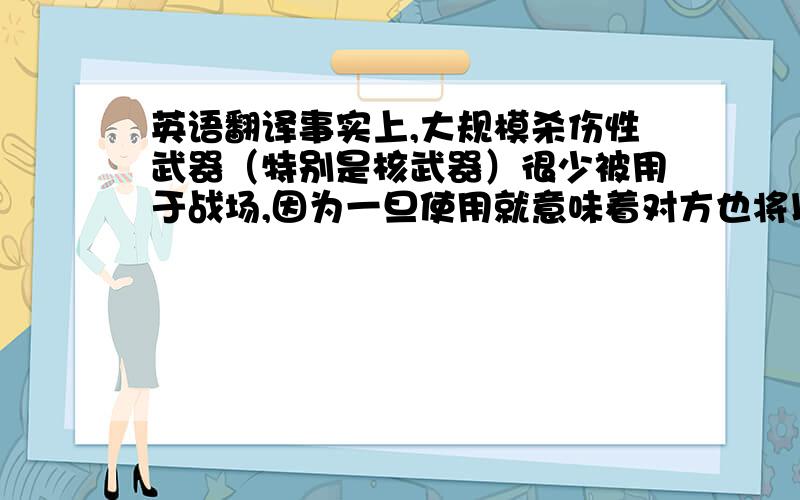英语翻译事实上,大规模杀伤性武器(特别是核武器)很少被用于战场,因为一旦使用就意味着对方也将以类似的武器回击,最终的后果是无可设想的,伤害规模之大足以摧毁整个人类文明.冷战
来源:学生作业帮助网 编辑:作业帮 时间:2024/11/17 12:46:49

英语翻译事实上,大规模杀伤性武器(特别是核武器)很少被用于战场,因为一旦使用就意味着对方也将以类似的武器回击,最终的后果是无可设想的,伤害规模之大足以摧毁整个人类文明.冷战
英语翻译
事实上,大规模杀伤性武器(特别是核武器)很少被用于战场,因为一旦使用就意味着对方也将以类似的武器回击,最终的后果是无可设想的,伤害规模之大足以摧毁整个人类文明.冷战中这就被称为“相互保证毁灭”(Mutual Assured Destruction),也是冷战最终没有演变为美国和苏联之间真正的战争的原因.
一般而言,大多数人不欢迎大规模杀伤性武器,担心一旦落入危险的领导人手中所可能带来的灾难性后果.很多人士都在推动防止大规模杀伤性武器的扩散,以及对现有大规模杀伤性武器的销毁.
英语翻译事实上,大规模杀伤性武器(特别是核武器)很少被用于战场,因为一旦使用就意味着对方也将以类似的武器回击,最终的后果是无可设想的,伤害规模之大足以摧毁整个人类文明.冷战
In fact,weapons of mass destruction (particularly nuclear weapons) is rarely used on the battlefield,because once the use of means they will take a similar weapon to fight back,the final result is no conceivable,damage size enough to destroy the human civilization.The cold war,this is called a "mutually assured destruction" (Mutual Assured Destruction),is a cold war did not evolve into a real war between the United States and the Soviet Union reasons.
Generally speaking,most people do not welcome the weapons of mass destruction,worried that once fall into the disastrous consequences of the potentially dangerous leaders.A lot of people are pushing to prevent the proliferation of weapons of mass destruction,and the destruction of existing weapons of mass destruction.